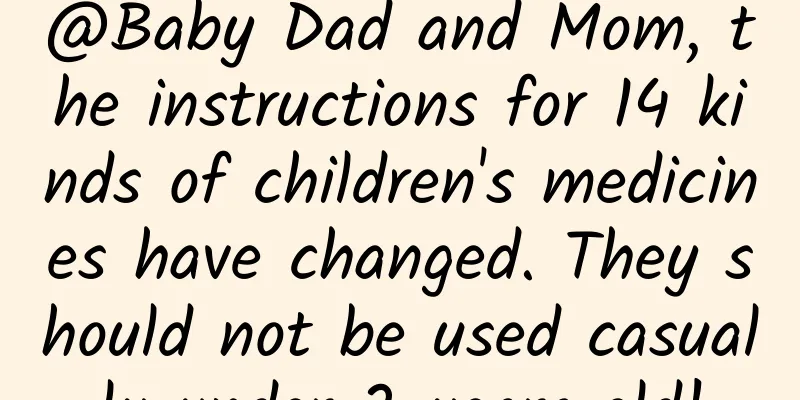@Baby Dad and Mom, the instructions for 14 kinds of children's medicines have changed. They should not be used casually under 2 years old!

|
On April 23, 2021, the National Medical Products Administration issued the "Announcement on the Revision of the Instructions for Use of 14 Drug Varieties Including Aminophenazone Oral Solution" (hereinafter referred to as the "Announcement"), revising the instructions for use of multiple pediatric cold medicines. The 14 drugs revised this time are all compound cold medicines, the list is as follows: Paracetamol and Aminophene oral solution, Paracetamol and Aminophene syrup, Paracetamol and Aminophene amylamine granules for children, Paracetamol and Pseudoephedrine chewable tablets, Paracetamol and Aminophene amylamine compound tablets for children, Paracetamol and Pseudoephedrine granules for children, Paracetamol and Pseudoephedrine granules, Paracetamol and Pseudoephedrine solution, Paracetamol and Pseudoephedrine compound tablets for children, Paracetamol and Pseudoephedrine oral solution, Paracetamol and Pseudoephedrine dispersible tablets (III), Paracetamol and Pseudoephedrine tablets for children, Paracetamol and Pseudoephedrine granules for children. Careful parents discovered that most of these were children’s cold medicines that were commonly available at home, so the announcement immediately sparked heated discussions among parents. Why do we need to revise the instructions for these 14 commonly used pediatric drugs? Can we still use these drugs when children have a cold? What changes have been made to the instructions for use of 14 children’s medicines? The Announcement clearly proposed to add a warning statement to the instructions for these 14 drugs: "It is not recommended that parents or guardians use this product on infants under 2 years old on their own. It should be used under the guidance of a physician or pharmacist." At the same time, three amendments to the [Precautions] in the drug instructions were also proposed: 1. Add "It is not recommended for parents or guardians to use this product on infants under 2 years old on their own. It should be used under the guidance of a physician or pharmacist." It is not difficult to find that this is the focus of the revision of the instructions for use of these 14 drugs. Why is this point particularly emphasized? This is because previous drug instructions lacked risk data support for the use of the drug in children of different ages. In 2007, the U.S. Food and Drug Administration (FDA) reported that between 1969 and 2006, there were 54 deaths among children in the United States who used decongestants (pseudoephedrine, ephedrine, etc.), and 69 deaths among children who used antihistamines (chlorpheniramine, diphenhydramine, etc.), most of which were children ≤ 2 years old. Therefore, cold medicines are not recommended for children under 2 years old. Since then, countries such as Australia, the United Kingdom, and Canada have also taken strict control measures on OTC compound cold medicines. Nowadays, the instructions for children's cold medicines sold in American pharmacies all indicate the restricted age range for use: prohibited for use under 2 years old; not recommended for use under 4 years old; children between 4 and 6 years old can use it under the guidance of a doctor; only children over 6 years old can use it independently based on symptoms. Let's look at some of the ingredients in cold medicines. Some ingredients must be used with caution or even prohibited for infants and young children. For example, amantadine contained in pediatric acetaminophen is prohibited for infants under 1 year old; chlorpheniramine contained in many medicines may cause abnormal agitation and even respiratory depression in young children under 2 years old. Based on the regulatory measures of various countries and the support of domestic regulatory data, the National Bureau issued an "Announcement" to revise the drug instructions, requiring pharmaceutical companies to limit the age of use in the drug instructions. This measure can make medication safer for children and effectively avoid the risk of drug abuse or overdose. 2. Add "The drug should be used strictly according to the instructions and dosage to avoid overdose." Most cold medicines are compound preparations, that is, they contain at least 2 to 4 ingredients. For children, if the following ingredients are used repeatedly or the dosage is not properly controlled, resulting in overdose, there will be great safety risks in medication: Acetaminophen: A commonly used safe antipyretic drug for children. Combination use or overdose can increase the risk of liver damage. Chlorpheniramine maleate: Long-term or excessive use can easily cause neurological symptoms such as drowsiness, abnormal agitation, and even respiratory depression. Pseudoephedrine hydrochloride: It is a type of stimulant. Overdose can cause arrhythmia, insomnia, and anxiety, and there is no data to support the safe dosage for children under 2 years old. Amantadine hydrochloride: an antiviral drug, but because most influenza viruses have developed drug resistance, it is rarely used alone in clinical practice, but it still appears in compound preparations from time to time. This drug also has many adverse reactions, and the risk will be further increased after overdose. Caffeine (anhydrous caffeine): Excessive intake can cause symptoms such as excitement, incoherent speech, convulsions, and arrhythmia. Dextromethorphan: There is a risk of respiratory depression, and there is no data to support safe dosage for children under 2 years old. Artificial bezoar: a traditional Chinese medicine. There is currently no data to support the risks of using it in children. 3. Change “Do not take other cold medicines with similar ingredients as this product at the same time” to “Avoid the combined use of cold medicines containing the same or similar active ingredients.” The most important point to emphasize is that cold medicines and antipyretic medicines should not be mixed! Compound cold medicines often contain multiple functional ingredients that can reduce fever, relieve cough, and relieve nasal congestion. If parents give their children antipyretics at the same time, it is easy to cause liver and kidney damage. Therefore, parents must pay attention: for young children, try to use single-ingredient medicines and use less compound cold medicines; when they really need to be used, they should be used under the guidance of doctors and pharmacists; when taking two or more medicines at the same time, be sure to carefully check the ingredients in the drug instructions, or consult a doctor or pharmacist to determine whether there are the same or similar ingredients. What is the reasonable use of cold medicine? The first step is to identify the symptoms. Accurately analyze the symptoms of the child, whether it is fever, sore throat, sneezing, or runny nose, because different medicines are used for different symptoms. The second step is to recognize the name of the medicine. Antipyretic and analgesic drugs - ibuprofen (suitable for children over 6 months old) and acetaminophen (suitable for babies over 2 months old). If your child has a fever, sore throat, or body aches, yes, choose TA. Antihistamines - chlorpheniramine maleate, cetirizine, loratadine, etc. If your child has allergy-like symptoms such as nasal congestion, sneezing, runny eyes, and runny nose, you can use medicines containing this ingredient. Cough suppressant - Dextromethorphan. Because cough is actually a protective reflex, it is not recommended to suppress cough blindly. However, if the child only has a dry cough and it affects rest, some cough suppressants can be used. It is recommended to go to the hospital for treatment to identify the cause of the child's cough and the doctor will give a treatment method. The third step is to choose the right medicine for your child. Choose the right medicine based on the symptoms your child has. If your child has no symptoms, don't waste the medicine. When choosing medicine, remember to check the ingredient list to see if it meets your child's needs. It is never too cautious to use medication on children 1. Avoid overdose When using, the dosage and usage for children should be strictly followed in the drug instructions. Parents should not increase the dosage on their own if they think that the effect is not good after taking it once. 2. Pay attention to the course of medication Generally, if the child's symptoms do not improve after taking the medicine for 3 to 7 days, you need to consult a doctor or pharmacist for further information. Because the baby's heart, liver, kidneys and other internal organs are delicate and the condition changes quickly, parents should carefully observe the changes in the condition. If the symptoms worsen or other complications occur, you must seek medical attention in time for a clear diagnosis. 3. Pay attention to the "prohibition" and "use with caution" in the instructions Situations where cold medicine is prohibited: people who are clearly prohibited from taking it as stated in the instructions must absolutely not take it. Situations where you should use cold medicine with caution: The medicine may cause adverse reactions, usually in children, the elderly, pregnant women, breastfeeding women, people with allergies, and people with liver and kidney dysfunction. These people are prone to serious adverse reactions, so you should be extra careful when using the medicine. Colds usually last for 5 to 7 days. During this period, you should pay attention to giving your child plenty of water. You can use a humidifier to keep the indoor air moist. It is not recommended for young children to take compound cold medicines. Nasal symptoms can be relieved by saline nasal drops and nasal irrigation. Babies over 1 year old can drink honey water to relieve coughs. If the fever is above 38.2℃, you can give the child appropriate antipyretics. If the child's symptoms persist or are severe, please seek medical attention in time. Author: Futang Children's Pharmacy Health Communication Group Review expert: Wu Xuexin, chief pharmacist of Qilu Children's Hospital of Shandong University, Futang Children's Medication Consultation Center |
<<: How to choose yacon? What kind of sweetness does yacon have?
>>: Is perseverance that important?
Recommend
How to effectively treat gynecological fungal infections?
The female genitals are very easy to breed and be...
Can I still breastfeed at two months old?
Generally, normal women's breasts will secret...
Signs of recurrence of fungal vaginitis
Due to the special physiological structure of fem...
How to wake up the fetus in the belly
Once pregnant, in order to give birth to a health...
What are the precautions for amniocentesis?
Although amniocentesis is a relatively minor oper...
If you have hepatitis B, can you not even eat normally?
This is the 3115th article of Da Yi Xiao Hu These...
Can pregnant women with candidal vaginitis take medication?
During pregnancy, because of the large amount of ...
What is the normal biparietal diameter at 32 weeks of pregnancy?
The biparietal diameter of the fetus refers to th...
What to eat for bilateral breast hyperplasia?
Nowadays, more and more women are experiencing br...
Which is better for gynecological embolization?
Many female friends who suffer from gynecological...
What should women eat to promote follicle development?
We all know that being a mother is the wish of ma...
Where should you “cover” in spring? Remember these three points
As the saying goes, "Keep warm in spring and...
Will menstruation suddenly stop coming?
We all know that every normal woman will have men...
Nine hazards of lack of sleep for women
Lack of sleep can cause great harm to women's...
How to calculate the heating period_When is the heating period for women
With the positive response to my country's tw...









